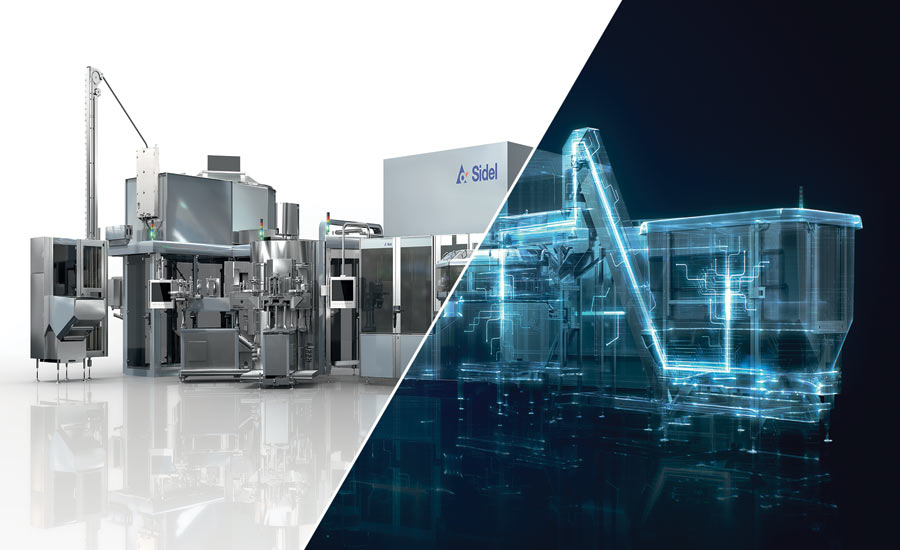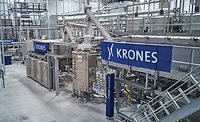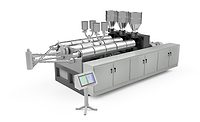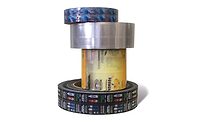With Industry 4.0 driving technological innovation and automation, plastic bottle manufacturers are keeping pace by releasing energy-efficient, reliable and flexible blow-molding machines that not only can produce high-quality, lightweight bottles but also keep total cost of ownership (TCO) low.
Equipment suppliers note that market drivers for PET bottle manufacturing lines are focused on reducing TCO, overall plant footprint and resources. Personalization of products and eCommerce also are impacting plastic bottle manufacturing.
“One of the biggest trends impacting producers of plastic bottles is the increasing demand for personalization and the adoption of eCommerce routines,” explains Frederic Sailly, executive vice president of product management and development for the Sidel Group, Parma, Italy. “At the same time, smartphone applications are allowing [for the] comparison of prices from supermarkets, forcing distributors to differentiate themselves.
“This is resulting in the emergence of promotional packs (e.g., rainbow packs and smaller cases), requiring changes at regular intervals with shorter and shorter runs and more frequent format changes, plus the introduction of new formats at a faster pace,” Sailly continues. “This forces modern manufacturers to produce both an increasing number of product types and a variety of SKUs.”
The growing demand for personalized products, diverse consumer preferences and increased consumer spending power also are impacting the industry, Sailly says.
“The ability of production solutions to satisfy output requirements for new products efficiently, while implementing technologies that improve long-term viability, yet keeping TCO as low as possible, has become vital to manufacturers’ success,” he says.
Atlanta-based SIPA North America notes that flexibility, lightweighting and new materials, coatings and manufacturing technologies are improving the plastic bottle manufacturing process.
Recently, the company introduced a new generation of rotary ISBM machines with the flexibility to produce both hot-fill and carbonated soft drinks with quick mold and neck changeovers and the ability to switch from a 26-mm neck to a 33-mm neck in a few hours. The machine also can produce single-serve bottles at high-level outputs while accommodating bottles as large as 3.5 liters.
SIPA also offers the SFL, a linear blow molder that flexibly produces as many as 16,000 bottles per hour (bph).
Designing a Smart Bottle
Although flexibility is vital when selecting plastic bottle manufacturing equipment, sustainability trends also continue to impact original equipment manufacturers.
“Lightweighting is still a trend, particularly since PET prices are going up again,” a SIPA spokesperson says. “Multiple solutions are available to use less resin, starting from a smart bottle design and engineering. Our new machine introduces many features to support this reduction of plastic.
“Customers are looking for reliability and consistent production over a long period and, of course, with minimum operating expense,” the spokesperson adds. “They want high-tech products but [that are] easy to operate and maintain.”
Dortmund, Germany-based KHS highlights that reducing plastic and optimizing bottle design is only one part of the equation when it comes to assisting customers.
Marco Böhnke, product manager for stretch blow molding technology at KHS, says: “As the market driver, KHS not only looks at their own equipment but also understands their customers’ needs for a perfect bottle. The Bottles & Shapes group is looking into optimizing bottle design concerning all TCOs.”
Böhnke notes that bottle weight remains the driving factor for bottle design. To exemplify this, KHS presented its Factor100 Bottle, a 500-ml bottle that weighs 5 grams and was developed in cooperation with Husky Injection Molding Systems. With the market growth in bottled water, equipment suppliers are developing new systems for still water in single-serve formats, experts note.
KHS Group also offers its InnoPET TriBlock Aqua M machine, a high-performance block system that was designed to accommodate the growth in the bottled water category.
The compact unit processes container sizes between 250 and 800 ml at a rate as fast as 50,000 bph and provides neck handling and the InnoPET Silent TipTainer, the company says.
Compared with the previous model, the new series has blow stations in which small bottles with a maximum diameter of 75 mm can be blown with less noise as a result of the InnoPET Silent TipTainer, which features a closed system with lower PET preform height that gently and quietly feeds the bottles to the sorting unit, the company says.
KHS further expanded its portfolio with its new InnoPET Plasmax 2Q and 4Q, which provide a PET barrier coating of silicon oxide to the inside of PET bottles. KHS FreshSafe PET coating covers the inside of the PET bottle with a wafer-thin layer of pure glass that will protect sensitive products such as juice, wine and liquid food from oxidation. It also protects carbonated beverages from carbon dioxide loss and considerably lengthens shelf life, the company says.
All-in-One Solution
Demand for innovation in the beverage industry will continue beyond new products to developing new, more efficient and compact machines and processes, experts say.
The adoption of Industry 4.0 also is a key driver for technological innovation and automation, the Sidel Group’s Sailly says.
He notes that Sidel’s Agility 4.0 program was developed to help make the “smart” factory of tomorrow a reality. The program is driven by five pillars: Virtual Factory, Smart Factory, Connected Factory, Sustainable Factory and Extended Factory, which bring Smart Factories to life to create a world of greater choice and unique consumer experiences driven by packaging, mass customization and product diversity.
Sidel’s latest innovation, the Sidel Super Combi, is designed and engineered as a single smart solution for bottled water and carbonated soft drink manufacturers, it says. It features integrated data-driven intelligence, ensuring optimum performance across the entire production process.
The next-generation solution integrates five process steps — preform feeder, blower, labeler, filler/capper and cap feeder — into an all-in-one smart system. It also combines intelligent automation with innovative technologies of connected machines and data-analytics management, leading to optimized production and maintenance services, the company says.
“The built-in intelligence of Sidel Super Combi represents a great example of what we deliver as ‘Smart Factory’ and ‘Connected Factory,’” Sailly says. “We are talking about an all-in-one system capable of increasing performance and maintaining long autonomous production runs without highly skilled operator intervention.
“Also, the machines are self-adjusting and adapting to changing manufacturing conditions and external factors. They are predicting future failures and suggesting optimized maintenance actions,” he continues. “They are capable of sustaining performance by anticipating human intervention when needed through smart alerting systems and portable devices.” BI




